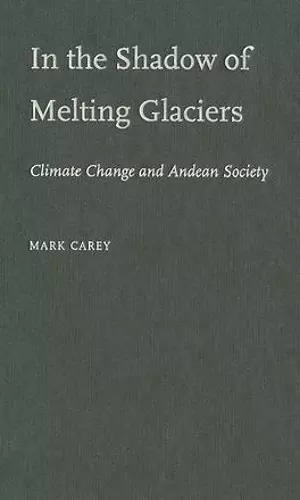In the Shadow of Melting Glaciers
Climate Change and Andean Society
Format:Hardback
Publisher:Oxford University Press Inc
Published:6th May '10
Currently unavailable, and unfortunately no date known when it will be back

Climate change is producing profound changes globally. Yet we still know little about how it affects real people in real places on a daily basis because most of our knowledge comes from scientific studies that try to estimate impacts and project future climate scenarios. This book is different, illustrating in vivid detail how people in the Andes have grappled with the effects of climate change and ensuing natural disasters for more than half a century. In Peru's Cordillera Blanca mountain range, global climate change has generated the world's most deadly glacial lake outburst floods and glacier avalanches, killing 25,000 people since 1941. As survivors grieved, they formed community organizations to learn about precarious glacial lakes while they sent priests to the mountains, hoping that God could calm the increasingly hostile landscape. Meanwhile, Peruvian engineers working with miniscule budgets invented innovative strategies to drain dozens of the most unstable lakes that continue forming in the twenty first century. But adaptation to global climate change was never simply about engineering the Andes to eliminate environmental hazards. Local urban and rural populations, engineers, hydroelectric developers, irrigators, mountaineers, and policymakers all perceived and responded to glacier melting differently-based on their own view of an ideal Andean world. Disaster prevention projects involved debates about economic development, state authority, race relations, class divisions, cultural values, the evolution of science and technology, and shifting views of nature. Over time, the influx of new groups to manage the Andes helped transform glaciated mountains into commodities to consume. Locals lost power in the process and today comprise just one among many stakeholders in the high Andes-and perhaps the least powerful. Climate change transformed a region, triggering catastrophes while simultaneously jumpstarting modernization processes. This book's historical perspective illuminates these trends that would be ignored in any scientific projections about future climate scenarios.
Adds a significant dimension to Latin American environmental history. It is one of the first sustained investigations of the human and economic costs of climate change in the region, and numbers among a handful of studies to weigh the long-term implications of glacier retreat anywhere in the world. * American Historical Review *
with its clear writing and easy-to-follow narrative, In the Shadow of Melting Glaciers makes a significant contribution to many academic endeavours. This book will be valuable in both undergraduate and graduate courses, where it can be used to show the ways in which different actors contribute to or are excluded from policy decisions in the face of natural disasters. We can only hope that the knowledge brought forth in Carey's book can be absorbed by policymakers before all prospects recede. * Nicolas E. Gordon, Ab Imperio *
ISBN: 9780195396065
Dimensions: 156mm x 234mm x 18mm
Weight: 576g
288 pages